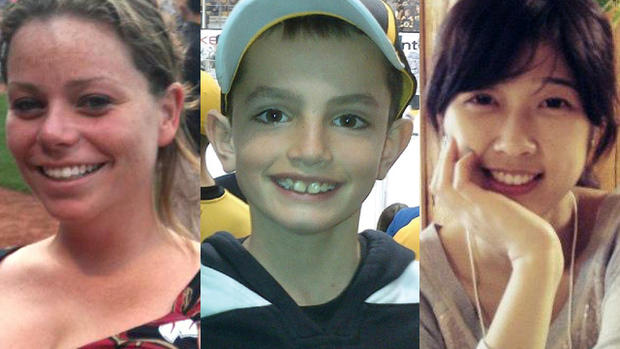Boston Marathon fund chief: Lower your expectations
BOSTON The administrator of a fund created to help Boston Marathon bombing victims has a blunt message for them: Lower your expectations.
Attorney Kenneth Feinberg said at a public meeting Tuesday that the $28 million One Fund Boston won't pay out nearly enough to fully compensate the families of the three killed or the more than 260 injured, and may not pay much of anything to those with less serious injuries.
"There isn't enough money to pay everybody who justifiably expects it or needs it," he said.
Meanwhile, there was no resolution about where to bury one of the two suspects in the attack.
- Boston bombing victims, families could get $1M
- Friend of Boston bombing suspect Dzhokhar Tsarnaev released
- Worcester man wants to send Tsarnaev body to Russia
- What to do with an alleged terrorist's body?
An aide to Boston Mayor Thomas Menino said he did not want to see Tamerlan Tsarnaev, who was a resident of Cambridge, buried in Boston and called the decision "a family issue."
"He believes he should be sent back to Russia. It wouldn't be appropriate for him to be buried in Boston," Menino spokeswoman Dot Joyce said. "He said his family wants him in Russia and that's where he should go."
Worcester funeral home director Peter Stefan says more than 100 people in the U.S. and Canada have offered burial plots for the body, but officials in those cities and towns have said no. Tsarnaev was killed in a shootout with police days after the April 15 bombings.
A Worcester police spokesman said Tuesday officials are hopeful they can resolve the issue within the next few days. Tsarnaev's younger brother, Dzhokhar, is in a prison hospital facing charges that could bring the death penalty.
On Tuesday, the area near the marathon finish line, where two bombs went off, was busy with pedestrians as Feinberg spoke with victims and others at the Boston Public Library, directly across from the site of the first explosion.
Feinberg's warning to lower expectations wasn't lost on Dan Loring, whose daughter, Brittany, was so badly hurt by shrapnel from the first blast that she was in the hospital for 11 days. But the severity of her injuries still means she won't qualify for the largest payments, leaving her father wondering about money for her care, including out-of-pocket expenses associated with her three surgeries and rehabilitation.
Loring, who lives in Lancaster, Mass., said he walked two miles to his Cambridge hotel "just to clear my head" after a similar meeting with Feinberg on Monday night that drew about 100 people. A few dozen were at Tuesday's session, which Loring also attended.
"After leaving last night, I'm not so confident now we'll see much, if anything," he said.
Loring is not relying entirely on One Fund Boston, as an online campaign for his daughter on GiveForward has raised nearly $100,000 as of Tuesday. One Fund Boston was nearing $28.5 million, with about $11.5 million in public donations and about $17 million from corporations.
Feinberg's draft plan for distributing the money reserves the highest payments for the families of the three killed in the bombings — Martin Richard, Krystle Campbell, Lu Lingzi — and for the family of MIT Police Officer Sean Collier, who was shot to death by the bombers as they attempted to flee. Those who suffered brain damage or double amputation of limbs also have top priority.
Next are those who had single limbs amputated, followed by those who were injured enough to require overnight hospital stays.
Although he hasn't proposed specific dollar amounts for compensation, Feinberg has said the families of those killed or those who had limbs amputated could end up receiving $1 million each from the fund.
Feinberg said as many as 15 to 20 victims needed single or double amputations. That means the number of larger payouts to those most seriously hurt could use up the bulk of the fund.
Gov. Deval Patrick and Menino have made speed in getting the money to those who need it a top priority, said Feinberg, who hopes to begin sending payments June 30.
But Feinberg emphasized the plan isn't final and asked audience members their opinions on thorny issues that would lengthen the process, including whether a person's income or insurance should be considered, with people who have more money getting smaller payouts.
During the two meetings, family members of victims presented sometimes excruciating dilemmas, including one woman who on Monday said her daughter lost one leg, and doctors were working to save her other one. The woman asked whether she should file for compensation as a single or double amputee.
Others, including Loring, think money should be given to everyone who was hurt in any way by the bombings, even if it means less money for those with the worst injuries. He said people who helped save his daughter are still suffering mentally, but aren't eligible for a claim.
"Of the ... people who donated (to The One Fund), if you polled them, they think it's going to all the victims, not a selected class," he said after the meeting Tuesday.
Some weren't sure what to ask Feinberg. Liz Norden, whose two adult sons each lost a leg in the bombing, said Monday that she's "just focusing on the care of my sons. ... I don't know what questions I'm supposed to be asking or not asking."
Feinburg acknowledged the dilemmas and what he called the "rough justice" ahead in struggles to be both fast and fair. One example was his guideline under the draft plan that people who didn't suffer amputations and who spent an equal number of days in the hospital get the same payouts, even if one person's injury is far more severe.
"This is a horrible undertaking," Feinberg said. "It raises questions that I believe would defy Solomon in getting answers."
